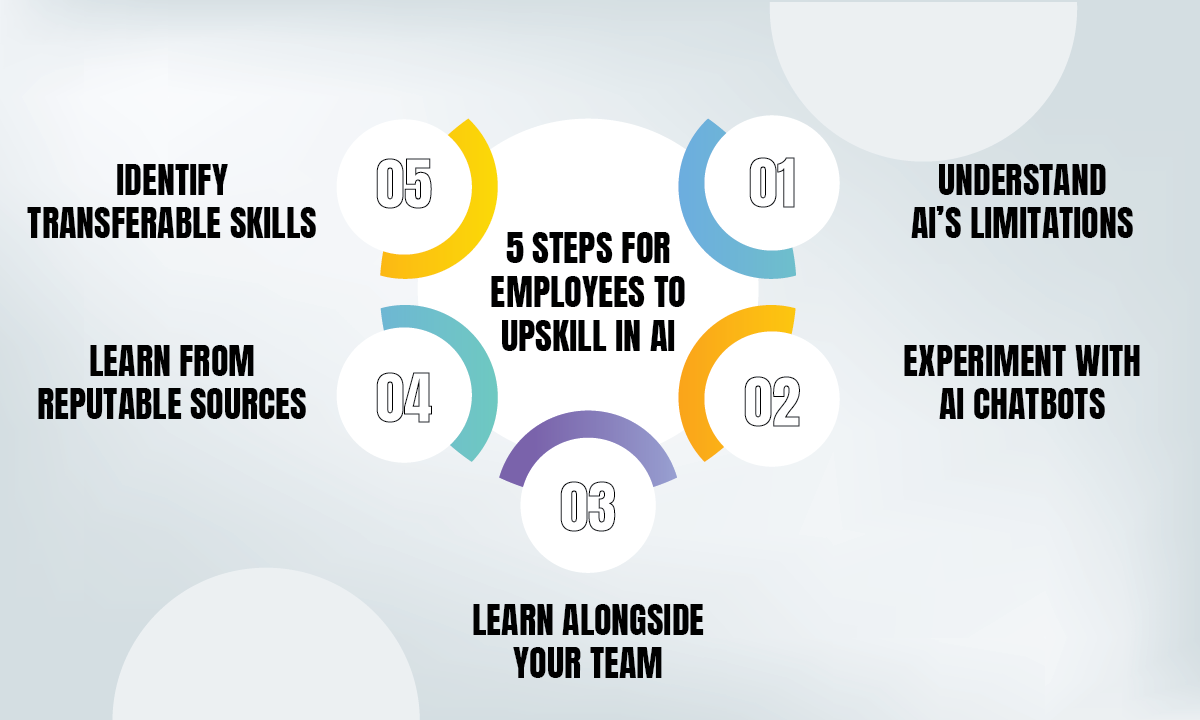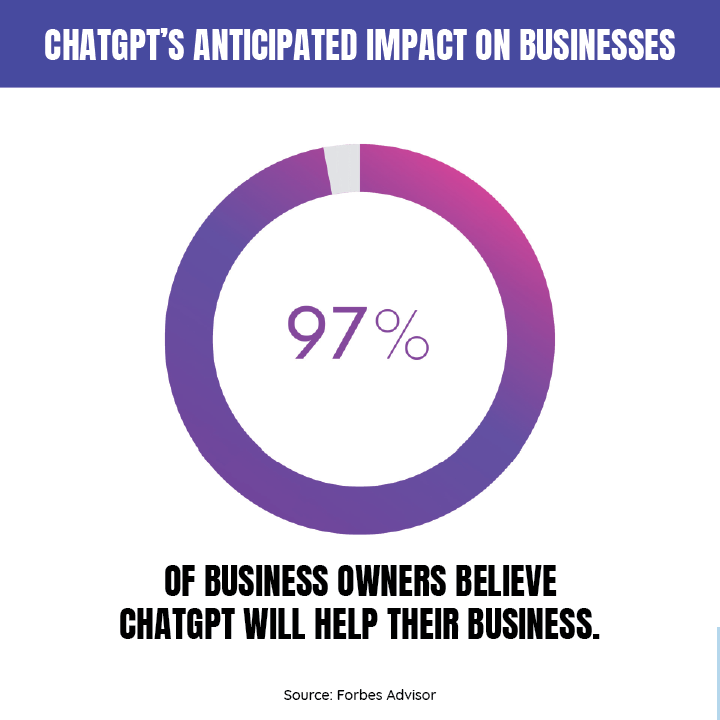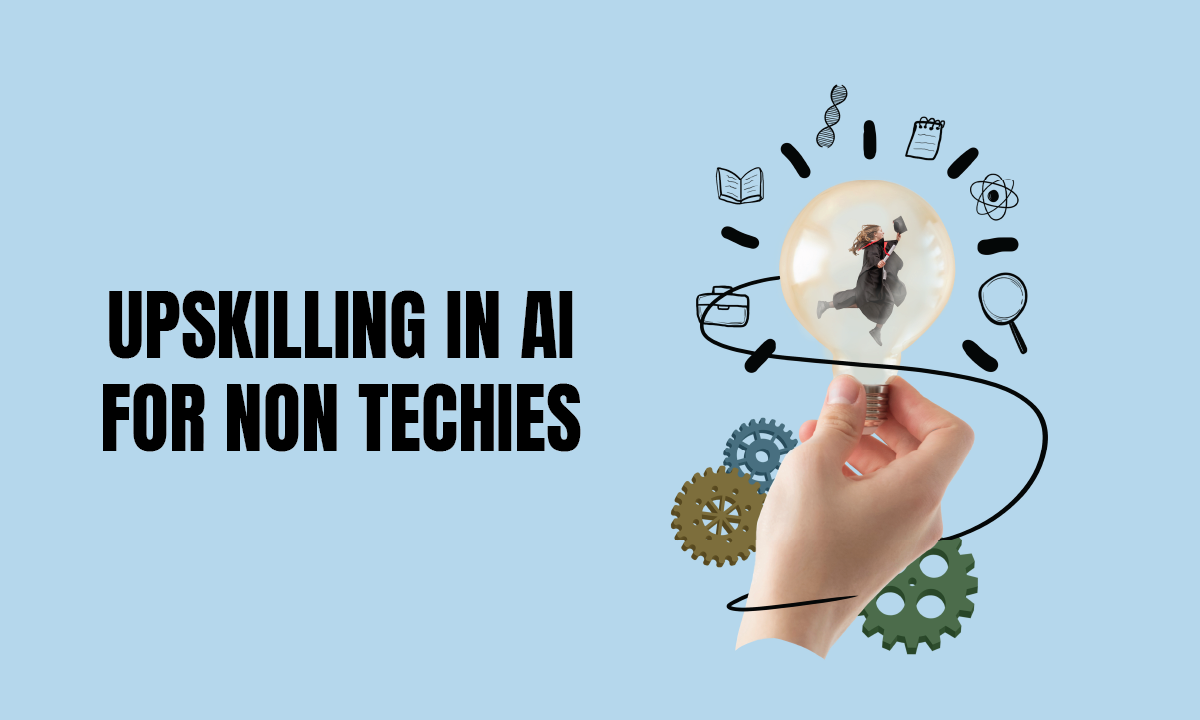So your company wants you to upskill in AI, even though you’re a non-tech employee. You’re not alone. Sixty-four percent of businesses expect AI to increase productivity, and 97% of business owners believe ChatGPT will help their business, according to Forbes Advisor. And these businesses that are adopting AI are not just tech businesses. Professions in manufacturing, finance, even teaching will be affected by AI adoption. In fact, a McKinsey report predicts that between 2016 and 2030, AI-related advancements may affect around 15% of the global workforce.
AI upskilling might sound daunting for professionals who don’t identify as tech-savvy. But AI is for all, and this step-by-step guide will help you forge your path toward AI mastery.

Table of Contents
- Identify Non-Technical Skills That Transfer to AI Upskilling
- Start Your AI Education Journey
- Understand AI’s Limitations
- Befriend Some Bots
- Make It a Team Learning Effort
-
Identify Non-Tech Skills That Transfer to AI Upskilling
The concept of artificial intelligence is heavily associated with IT and technical skills, which can intimidate professionals without a technical background. But the skills required to master AI in your role are not necessarily technical.
Katy George, senior partner and chief people officer at McKinsey, says digital competency stems from curiosity. “It’s about the mindset of trying new things and kind of adopting and experimenting. It’s a learning mindset — learning agility.” Think of your current role and all the learning you have done to master your everyday tasks. You have already demonstrated the skills required to learn how to use AI. Now let the learning begin!
-
Start Your AI Education Journey
The easiest way to start learning about AI is to find reputable resources — read their blogs, follow them on LinkedIn, and tune in to the discourse.
Follow PTP on LinkedIn and subscribe to the PTP Report.
Without doing the proper research, it’s easy to get bogged down by AI hysteria — the constant claims that AI will make our jobs obsolete, leaving us unemployed and miserable. Of course, some jobs will be affected by AI adoption, which can be unnerving. That’s why it’s important to learn how it will impact your industry in particular. Media jobs, for example, will be affected by AI’s ability to generate written, video, and audio content. Jobs in analytics will be affected by AI’s ability to predict trends based on large amounts of data. And so on.
-
Understand AI’s Limitations
Mastering AI as a non-techie starts when you take it off its pedestal, or, in other words, understand its limitations.
As an employee of an organization, you likely don’t have to worry as much about the legal side of AI (although it’s still worth being informed — read more about it in this PTP Report) Rather, you’ll want to know when you can and cannot rely on AI. For example, if you’re looking for recent market trends in your industry, you may have better luck asking Google, as ChatGPT can only access data as recent as January 2022.
AI also gets things wrong sometimes. This is called hallucination; you can read more about it in a previous PTP Report.
-
Befriend Some Bots
Prompt engineering describes a strategic way of telling an AI what you want it to generate for you. An effective prompt engineer, according to Forbes, “understands the language model’s capabilities, limitations, and tendencies, tailoring the input prompt to guide the model toward generating the desired content.” Ultimately, the goal is to be able to retrieve your desired output in one try.
A digital content writer, for example, needs to give clear and complete instructions for the AI to generate what they are looking for. Who is the audience? What tone are you going for? Is this for a blog, social media, or an email campaign? Maybe you need an outline rather than a full article. Effective prompt engineering saves time and headaches as you go about your work day. And it can be fun to practice!
-
Make It a Team Effort
If you work on a team who has made it a goal to upskill in AI, why not learn in community? Hopefully, your boss has incorporated upskilling into your work obligations, and there’s time to learn on the job. This presents a valuable opportunity to drop educational resources into your team’s group chat — think YouTube videos, articles, and thought leaders on social media.
As with all team efforts, communication is key. Don’t hesitate to ask your manager clarifying questions about how you will put your AI knowledge to use, or plans for team-wide AI training. A good manager will understand that there may be moments of confusion and uncertainty, as with any learning experience. Don’t be afraid to vocalize any challenges, especially in a team setting considering you are likely not the only one with questions.
Conclusion

The statistics speak for themselves – AI is becoming an integral part of businesses across various industries, and professionals from all backgrounds have a role to play in mastering it.
Whether you’re a marketer, a teacher, or a finance professional, there are opportunities to harness the power of AI and thrive in your career. By identifying your transferable skills, educating yourself, experimenting with technology, and learning alongside your team, you can pave the way for personal and professional growth in the AI era.





